Gerard Butler is a blockbuster star who has had a prolific film career over the years. Butler himself was born in a small town in Scotland, and before he was an actor, Butler was studying law to become a practicing lawyer (via Daily Record).
Acting was a risky career move for Butler since he didn’t start seriously pursuing it until he was almost 30 — long after most people would have already given up on their dreams.
Luckily, Butler rose to stardom relatively quickly with his roles in cheesy, good-bad flicks like “Dracula 2000” and, later, “300” and “Geostorm.” Now, what is a “good-bad” film anyway?
Well, a good-bad film is objectively “bad,” but is still enjoyable to watch nonetheless (even if only ironically). Action films in particular are prone to this kind of designation, due to being rife with ridiculous plots, bad dialogue, and cheesy effects.
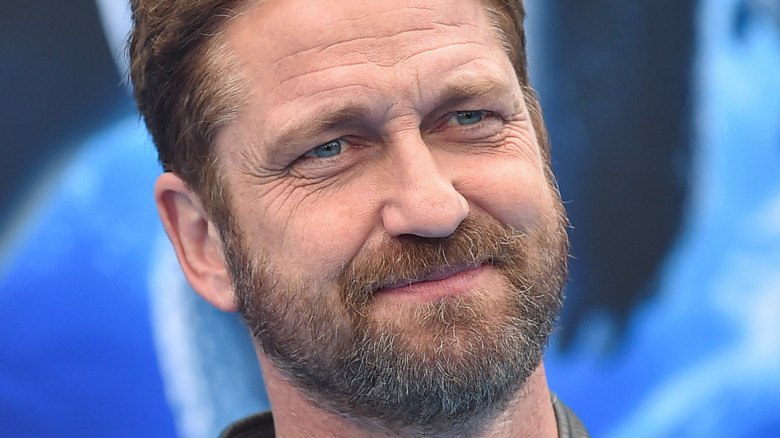
Like (and sometimes even more than) Butler’s middling action hero contemporaries — such as Mark Wahlberg or your Dwayne “The Rock” Johnson — the actor stands out due to his unwavering sincerity and commitment to his roles. He is also usually the best part of any film he’s in, no matter how bad they are (and, yes, they’re often very bad).
From the looks of Gerard Butler’s latest, the 2023 action-thriller “Plane,” he seemingly embraces his rich tradition of being the highlight of terrible-but-great actioners. To celebrate, here is a look back at Butler’s action film career, what his most iconic roles are, and why he should be cemented as the ultimate king of so-bad-they’re-good action flicks.
Dracula 2000 (2000)
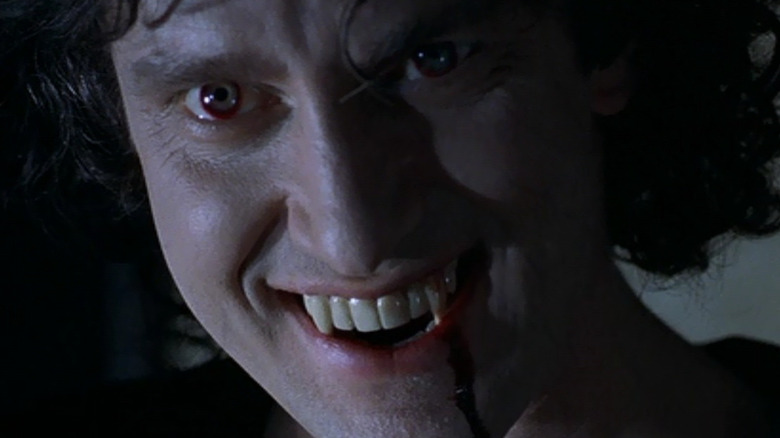
Miramax
The cheesy horror flick “Dracula 2000,” which was serendipitously released in the year 2000, is about Dracula (played by a very young and alluring Gerard Butler) being awakened in the (at the time) modern day.
This is because a group of thieves, including “Love & Basketball” star Omar Epps, rob the high-tech vault from the mansion of Matthew Van Helsing (played by Christopher Plummer). However, it’s later revealed that Matthew Van Helsing is actually the original Abraham Van Helsing from the Bram Stoker novel, prolonging his life through leeches infused with immortal Dracula blood.
With Butler’s Dracula now freed, he proceeds to turn the thieves into vampires, as well as turning a news reporter (Jeri Ryan) into one of his new brides. It then falls on Van Helsing, who feels guilty that he didn’t finish the deed years ago, and his protege Simon (played by “Hackers” star Jonny Lee Miller) to finally stop him once and for all.
The film itself isn’t great (despite boasting a banging nu-metal soundtrack that included the likes of Disturbed, System of a Down, and Linkin Park); nonetheless, Butler shines in a star-making turn as the Count himself.
He exudes the prerequisite charisma, menace, and even pathos that the character needs to succeed. It’s a shame the rest of the film doesn’t measure up. He even makes the film’s ludicrous twist about Dracula being literally Judah from the Bible (which is why he hates crosses) kind of work.
Attila (2001)
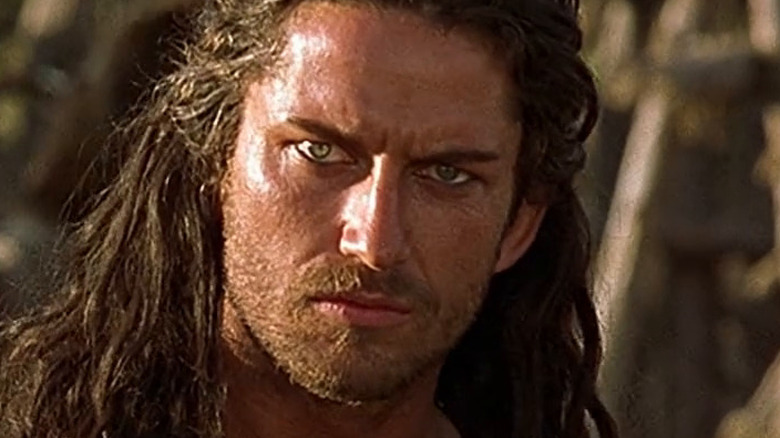
USA Network
Following “Dracula 2000,” Gerard Butler found himself starring in the 2001 “historical” miniseries “Attila,” based on the exploits of Attila the Hun (406–453 AD) – mostly focusing on Attila’s attempts to conquer the flailing Roman Empire.
As you can guess, this is the kind of casting that hopefully wouldn’t fly today, as Attila the Hun was actually of Mongolian descent, and not, you know, Scottish. It’s honestly just as egregious as John Wayne playing Genghis Kahn in 1954’s “The Conqueror.”
Regardless, unlike Wayne’s Kahn, Butler is actually able to infuse Attila the Hun with some true pathos and gravitas — almost overcoming the problematic white-washing of history. Almost. That’s because Butler has an undeniably commanding presence, which would later serve him well in Zack Snyder’s “300” adaptation as King Leonidas, and we see the beginnings of that here.
Butler is supported by an eclectic cast of respected character actors, including Powers Boothe, Liam Cunningham, and even Tim Curry, who all certainly elevate the hacky material (or, at the very least, exacerbate the camp level to keep the series from getting too dull or boring).
However, the other big problem with the “Atilla” miniseries is that besides what’s already been mentioned vis-a-vis the casting of the main character, the miniseries aired on the USA Network with a cable TV budget …and looks it.
Even big-budget films of the era struggled with CGI and wide-scale battles, so 2001’s “Attila” never even stood a chance. Its innumerable historical inaccuracies also bring down the quality of the miniseries as well.
Reign of Fire (2002)
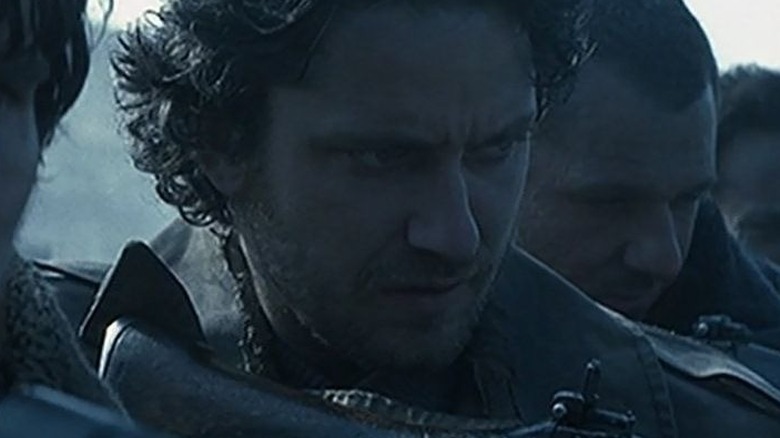
Touchstone Pictures
What would happen if dragons suddenly appeared and took over the world in the modern day? That’s an intriguing premise, right? And it’s one the 2002 action film “Reign of Fire” tried to depict — emphasis on “tried.”
While there are some fun sequences, the film itself ultimately doesn’t come together and is marred by a surprising lack of dragon action due to a low-for-the-premise budget (about $60 million, via Box Office Mojo).
Again, though, the film can’t be blamed for a lack of trying. “Reign of Fire” is set in the post-apocalyptic future of 2020 (at least they got the date right), after dragons were unleashed upon the unsuspecting world. All that’s left of humanity are scattered settlements in the burnt-out ruins of our former civilization.
The film follows the put-upon Quinn (Christian Bale), who is just trying to get by, alongside his best friend Creedy (our main man, Gerard Butler) — that is, until the bald, muscle-bound, and tatted-up Denton (a super game Matthew McConaughey), the leader of a team of militarized roughneck dragon hunters, arrives at their settlement.
However, while McConaughey clearly steals the show as the aforementioned Denton, Gerard Butler does a great job as Quinn’s fun-loving best friend Creedy.
In fact, one of the highlights of the film is a scene where, since the film is set in a post-dragonpocalypse future, Creedy and Quinn recreate a low-rent stage production of “Empire Strikes Back” to the delight of the surviving children. In fact, (spoilers for an over two-decades-old movie), Butler’s character’s ending is probably the most affecting in the whole film.
Lara Croft: Tomb Raider – The Cradle of Life (2003)
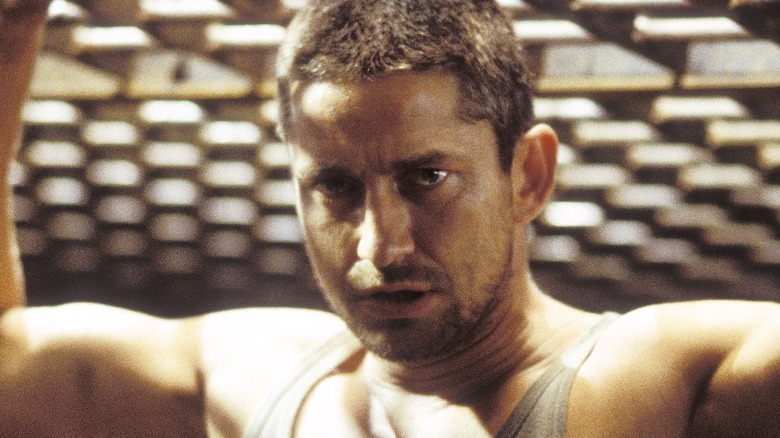
Paramount Pictures
Video game movies haven’t had the best reputation in Hollywood — and with good reason. And, while video game adaptations are getting more critical and financial success lately (see, for example, the “Sonic the Hedgehog” films), 2003’s “Lara Croft: Tomb Raider – Cradle of Life,” the sequel to 2001’s “Lara Croft: Tomb Raider,” isn’t one of those exceptions.
Meanwhile, star Angelina Jolie returned as the titular Lara Croft: Tomb Raider, and is great in the role as always, even when the film around her doesn’t fully coalesce into anything substantial. It is fun when she punches a CG shark though.
Another highlight was a young, hunky Gerard Butler playing the ostensible love interest opposite Jolie’s sexy British adventurer. He plays Terry Sheridan, a highly skilled, but also highly untrustworthy and rogue-ish thief, who Croft initially meets while he’s locked up in a prison cell.
Butler elevates the role of Terry because he adds real danger and menace under his otherwise easy charm. Unlike a lot of these types of roles, he really keeps you guessing about what side he’ll ultimately end up on as the alliance strikes with Jolie’s Croft is a tenuous one at best. In fact, his presence greatly elevates the entire, admittedly mediocre adaptation due to the uneasy energy he brings to what could’ve been a pretty rote role.
Timeline (2003)
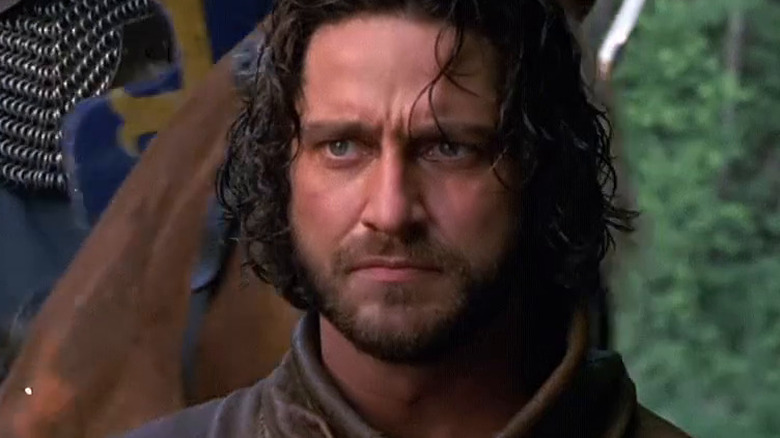
Paramount Pictures
Author Michael Crichton is probably best known for his novels “Jurassic Park,” “The Andromeda Strain,” and “Westworld,” as well as the films and TV shows based on his work. However, one of his (relatively) lesser-known works was the nonetheless still best-selling 1999 novel “Timeline.”
It followed a group of college students who found themselves — through sci-fi shenanigans — traveling back in time to Medieval France. There, they try to fit in and survive the hardships of that time period while also trying to avoid creating too many paradoxes.
In the film version, helmed by acclaimed filmmaker Richard Donner (director of the original “Superman” film), Gerard Butler plays André Marek, a Scottish archaeologist who joins the time-traveling expedition into the Medieval era, and who ends up making the ultimate sacrifice to protect the eponymous timeline. He’s joined by an all-star cast, including “Fast and the Furious” favorite Paul Walker, Billy Connelly, David Thewlis, and Michael Sheen, among others.
Despite some heavy hitters in the cast (and Paul Walker), Butler gives undeniably the most realistic and grounded performance in the film, as well as the most depth. A lot of that is due to Butler’s characteristically committed performance. It also helps that he’s once again allowed to keep his patented Irish brogue, as his performances are definitely always hampered when he has to pretend to be American or something else.
300 (2007)
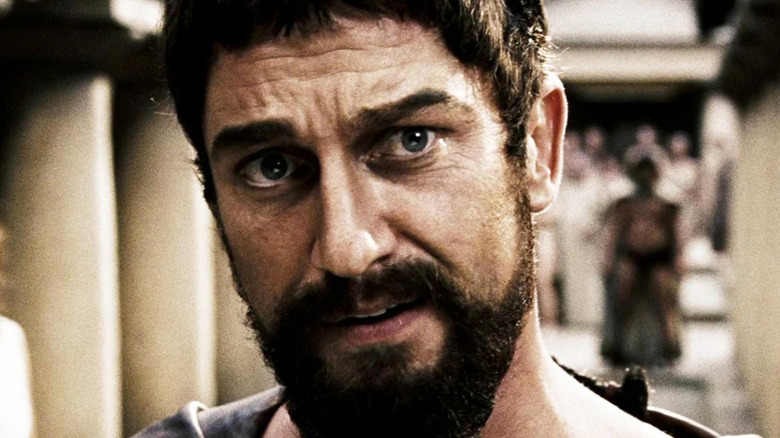
Warner Bros.
Arguably Gerard Butler’s most iconic role — and certainly the role that put him nearest to the A-list — is his portrayal of King Leonidas in Zack Snyder’s visually-stunning film adaptation of Frank Miller’s graphic novel “300.”
The story is (very) loosely based on the true event of Sparta raising an army of 300 men (hence the title), led by Butler’s aforementioned King Leonidas to march against the encroachment of Persia’s vast, invading army for one last stand. The story itself is narrated by the wounded soldier Dilios (“The Two Towers” star David Wenham), to rally the rest of Sparta to fight for freedom, after the original Spartans die after a very brave battle.
The film is best known for its stark, stylized CGI backgrounds, its propulsive and melodramatic score, and, of course, Snyder’s patented “slow-down/speed-up”-style ramped-up action choreography (which worked in “300,” but not so much in his version of “Watchmen.”)
As for Butler, while “Dracula 2000” indeed put him on Hollywood’s radar, nonetheless “300” is really where Butler’s career took off. It’s true the film itself has many (many) issues, but Butler’s commanding performance certainly isn’t one of them.
He exudes true strength, integrity, and honor, which gives authenticity to his men’s decision to follow him into oblivion. Only Butler’s committed delivery could have turned the now-iconic line “This. Is. Sparta” into such an eternal movie moment.
Gamer (2009)
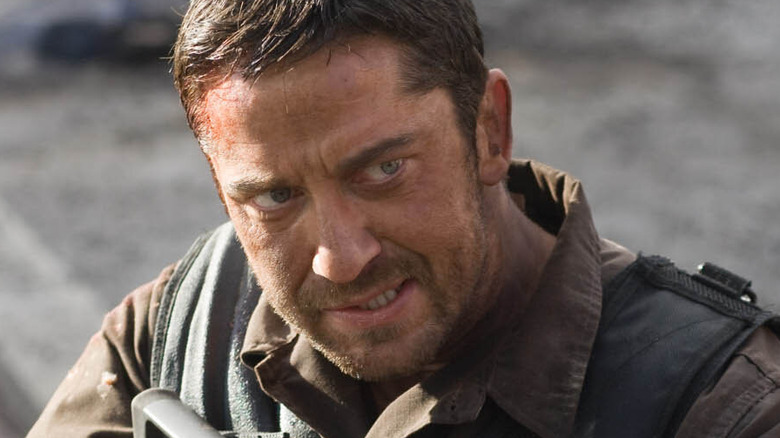
Lionsgate
2009’s dystopian action satire “Gamer” was directed by Mark Neveldine and Brian Taylor, the two filmmakers behind the “Crank” films and “Ghost Rider 2: Spirit of Vengeance.” It stars Gerard Butler as a pretty standard Gerard Butler character named John “Kable” Tillman, a violent, stoic, and badass military guy, who is sent to a future prison for a crime he didn’t really commit.
The film is set in a dystopian future where an eccentric tech bro billionaire named Ken Castle (played by “Dexter” star Michael C. Hall) has created a prison ecosystem where inmates are put on death row… with a catch. Instead of lethal injection or the electric chair, they are instead infected with nanobots and forced to be controlled by “gamers” as if their bodies were characters in a video game called “Slayers.”
Butler’s Tillman ends up being controlled by top “Slayer” player Simon (Logan Lerman) — presaging the rise of streamer celebrity culture — until Tillman starts dictating how Simon should control him, due to his extensive real-life combat experience.
The movie is a trip. It, unfortunately, falls prey to the mid-to-late 2000’s style of quick-cut, shaky-cam action, but it’s just too delightfully ridiculous to completely disregard (including a violent action climax inside the recreation of a “Sims”-like game full of similarly nano-controlled people). Butler, as well, helps ground the wildness with his patented committed and steely performance, alongside just the right amount of tongue-in-cheek to let you know he’s in on the fun as well.
Law Abiding Citizen
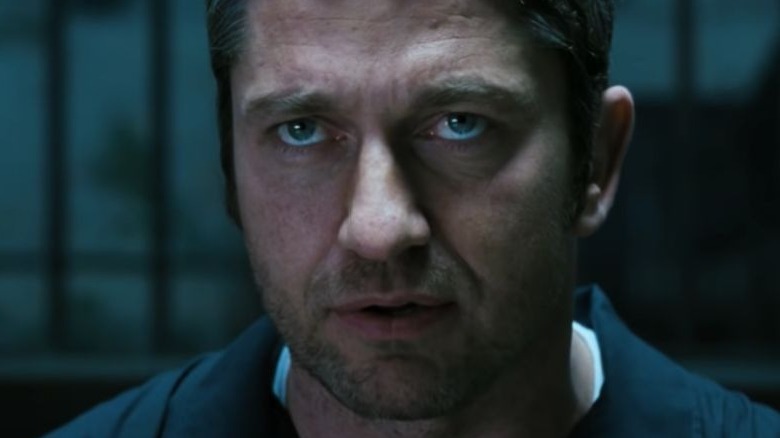
Overture Films
Partly “Saw”-inspired horror, and part legal drama, 2009’s “Law Abiding Citizen” is an interesting entry in the surprisingly lucrative “torture porn” genre of the mid-to-late 2000s. This is also one of Gerard Butler’s few antagonistic turns, as the film is actually a Jamie Foxx-starring vehicle.
Butler himself plays a seemingly normal, everyday man (other than the fact he looks like Gerard Butler) named Clyde Shelton, who becomes understandably unhinged after the death of his daughter at the hands of another man. Afterward, Clyde goes after the killer for revenge and proceeds to mutilate and torture him, not unlike the OG Jigsaw himself.
Meanwhile, Jamie Foxx plays Nick Rice, Clyde’s prosecuting lawyer, who gave the murderer a plea deal due to mishandling some evidence. Afterward, Butler’s Clyde declares revenge on the entire legal system that helped let the murderer get away with his crime, which of course includes Foxx’s prosecuting attorney, who Clyde feels failed to give him justice.
Despite the slightly ridiculous premise of “Law Abiding Citizen,” Gerard Butler, as always, nonetheless fully commits to the grief and conviction of the character.
You truly feel his pain and understand his anger, and in many ways, he’s much more sympathetic than Foxx’s opportunistic lawyer protagonist. Even when Butler cascades into full-on villainy towards the end, you still find yourself rooting for him regardless.
Olympus Has Fallen (2013)
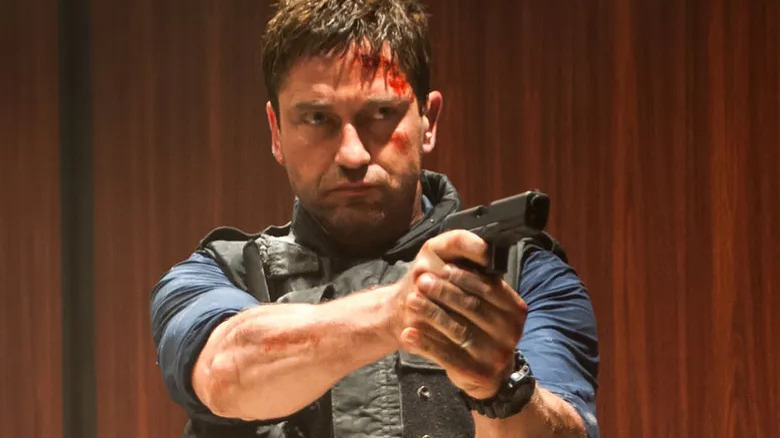
Millennium Films
2013’s bloody and violent throwback political action thriller “Olympus Has Fallen” — along with its sequels “London Has Fallen” and “Angel Has Fallen” — star Gerard Butler as the heroic former secret service agent Mike Banning, who is protecting the president from international terrorist threats.
It ended up going up against Roland Emmerich’s bigger budgeted and lower-rated (but also more politically relevant) “White House Down,” starring Channing Tatum and Butler’s former co-star Jamie Foxx in the same year.
In “Olympus Has Fallen,” the White House (apparently codenamed “Olympus”) is somehow infiltrated by North Korean terrorists (and, thus “fallen”). Worse, the president, played by Aaron Eckhart, is captured and held hostage as a political prisoner.
Meanwhile, Banning — who had previously retired from the secret service in shame after accidentally letting the first lady (Ashley Judd) die in a freak car accident during the film’s prologue — ends up having to use his former service knowledge to pull a “Die Hard” in the White House and ultimately save the day.
Banning is probably the most prototypical Gerard Butler action hero: He’s gruff, stoic, and badass, but also with a little twinkle in his eye that lets you know he knows this is all ridiculous, too, which lets you have fun along with him.
The bloody action — directed with aplomb by “Training Day” helmer Antoine Fuqua — is also particularly memorable and exciting… its reactionary and xenophobic politics, though, not so much.
Gods of Egypt (2016)
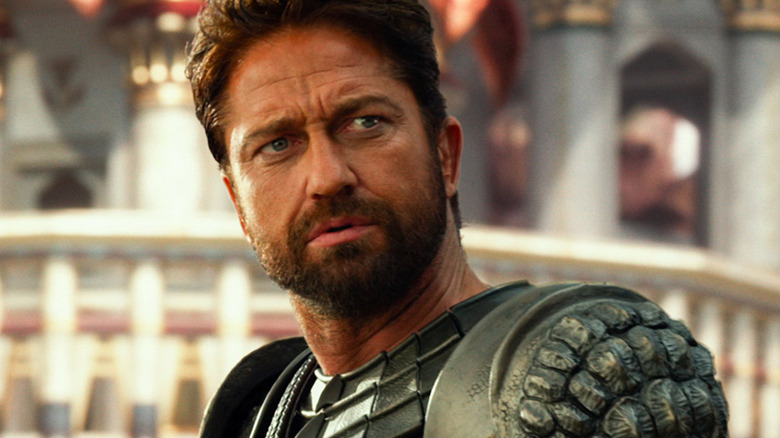
Lionsgate
Acclaimed genre filmmaker Alexander Proyas had spent years trying to develop a big-budget, action-packed adaptation of John Milton’s epic poem “Paradise Lost.” It would’ve depicted large-scale battle scenes between armies of angels wearing pseudo-futuristic armor (via SlashFilm).
Unfortunately, due to a variety of factors, that project fell apart, but Proyas still wanted to depict flying mythical creatures fighting in weird sci-fi armor. Thus, 2016’s “Gods of Egypt” was born. Instead of Christian mythology, though, the film instead follows Egyptian mythology (hence the title).
In the film, Gerard Butler plays the villainous Set, the Egyptian god of the desert. The plot is (very) loosely based on real Egyptian myths, and was like a plague on cinemas. Its CGI is PS1-level, its story is half-baked and full of tropes, and its characters are even thinner.
However, Butler at least makes the film bearable and is by far the best part about it. He looks like he’s having fun playing the part of the preening would-be god-king, and he’s seemingly also the only cast member to be aware of how absurd and terrible the movie he’s in is.
He chews the scenery with glee like a ravenous woodchipper, and even then the movie has the audacity to cover him up in a terrible CG-metal dog suit that looks like Tony Stark decided to be a furry. Also, it must be said: Like 2001’s “Attila,” Butler is once again playing a character that should probably be a Person of Color, as he’s supposed to be the god of Egypt, not Scotland.
Geostorm (2017)
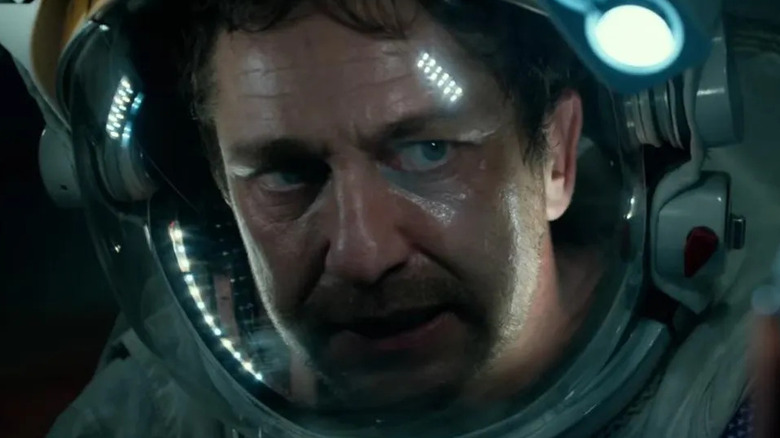
Warner Bros.
2017’s disaster epic “Geostorm” has one of the most ridiculous premises in a genre built on ridiculous premises. Directed by Dean Devlin, the former producer of disaster master Roland Emmerich (“The Day After Tomorrow”), “Geostorm” is about a state-of-the-art climate-controlling satellite being hijacked by terrorists, and then used to create rampant acts of nature all around the world, such as causing villages to freeze over in Afghanistan.
It’s later revealed to be a convoluted plot by the U.S. secretary of state (Ed Harris) to assassinate the president (Andy Garcia) and the rest of the line of succession with a powerful geostorm targeted at the Democratic National Convention.
Meanwhile, Gerard Butler stars as one of the satellite engineers that created the machine, who is sent up into space in an attempt to fix the machine before it wipes out all the Democrats in the United States. Butler, as always, adds a layer of sincerity to the ridiculous proceedings (and even more ridiculous) lines. It’s one of his lesser roles, since a lot of the main action happens on Earth, while he’s unfortunately stuck up in space, but he still ends up being one of the best things about the film anyway.
As a bit of contrast, Butler went on to star in another disaster thriller in 2020’s “Greenland,” and if there was ever any doubt that he could bring the requisite gravitas to a story like this, well, this film wowed critics and audiences alike. The film is, of course, one of several certified fresh entries in Butler’s filmography, but on the whole, the actor has made a name for himself as the go-to headliner for so-bad-they’re-good action fare, and “Plane” looks to be yet another gloriously goofball installment for him.